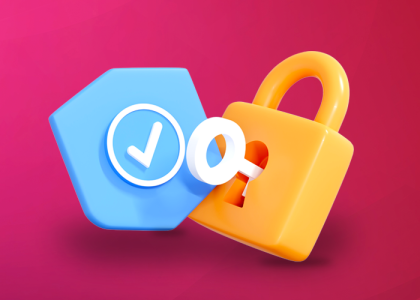Introduction
Your data is a treasure trove of useful information, and there are a lot of bad actors and malicious forces that want to get their hands on it. Data security is how we protect our valuable data from unauthorised users, cyberattacks and data breaches.
Data security can cover a huge range of areas, from hardware, to software, to software devices to administrative controls. It even covers policies and procedures.
The importance of data security really can’t be overstated, so how should you start?
Why is data security important?
Lots of organisations have been burned by poor data security protocols, with many having information of key customers leaked, or valuable information stolen and sold on. What are some of the key benefits of data security?
Protects confidential business information
As mentioned, your data is a genuine treasure trove of information. Customers and employees alike trust you to protect that data. By doing so, you’ll build a trustworthy reputation, which will pay off in the long term.
Even if it’s not stolen, you’ll want to reduce the risk that data gets lost or corrupted. Data security will help with that by improving your data hygiene and making all your usage purposeful.
Keeps your employees safe
The trust of your employees is a fragile thing, and once it’s broken it’s nearly impossible to get it back. Protecting your employee’s personal data is vital, as a leak will lead to all kinds of problems including an increased risk of fraud.
Ensure compliance
Protecting your data isn’t just a nice thing to do. It’s also a legal requirement in many cases. The Data Protection Act 2018 places very strict requirements on what minimum standards an organisation needs to uphold. It also sets out what punishments are in place for anyone who breaks those rules, which can include very high fines.
Controls access to your buildings
Access control is a fundamental security protocol that manages who can get access to certain systems. This needs to be considered from a digital angle, but you also need to think about physical access to spaces. A data security process will account for this, including things like access passes and training about tailgating through doors.
How do I ensure the security of data in my business?
But how can you keep data secure? There are a lot of options to consider, and what works best for one organisation might not work for yours. However, there are some solid best practices that will give you an idea of how to ensure security of data. These include:
- Securing your information by encrypting data and ensuring only people who need it have access
- Plan ahead with regular training, system tests and a crisis plan
- Delete data when you don’t need it anymore
What data security tools are available?
There’s a huge variety of data security tools to choose from, with a lot of different products that do similar things. The options you choose will have a huge impact on how to implement data security, so it’s a massively important step to consider.
Vulnerability data security management
If you can spot and remove potential issues before they’re exploited, then you massive reduce the risk of a data breach. This is called vulnerability management. The goal is to get rid of as many vulnerabilities as possible. It’s also never a one-and-done approach, as you must continually evaluate your systems to find new vulnerabilities.
Cybersecurity and access management
One of the simplest tools at your disposal, controlling who can access what files and networks. Physically preventing access to certain rooms (which might contain vulnerable servers) is also a method at your disposal.
Remember, social engineering (such as convincing someone you should have access to data that you shouldn’t) is one of the most pervasive methods of ‘hacking’, so robust training is also vital.
Malware protection
Organisations deal with a constant flow of traffic, and malware tries to sneak under the radar. From there it can break into your network and cause havoc. Malware protection, particularly through firewalls, anti-virus scanners and strong training can help here.
Network security
Network security is a very broad term that describes a range of hardware and software solutions all focused on protecting your network from cyberattacks. It can include all of the above tools, as well as VPN usage, encryption, network analytics and even specific network only security.
What are the benefits of using data security systems?
The importance of data security in business really can’t be overstated. If you want to keep your integrity and stay in line with your legal obligations, then it’s vital to build a strategy early. Here are some of the key benefits of data security.
Protect your business' reputation
Data breaches are hugely damaging to your reputation both with customers and employees. If your competitors have a better track record of security than you, customers will go elsewhere.
Even if a data breach doesn’t occur, customers appreciate seeing you understand the importance of data security and have considered how to keep data safe and secure. It can even form a core part of your brand.
Reliable, efficient & cost-effective
Data breaches are expensive. You need to pay for any fines, and then invest in improvements, often in an ad-hoc way that leads to inflated costs. By considering how to implement data security strategies early, you can find the most cost-effective approach that suits your needs.
Follow correct data security protocols
Data protection is a fundamental human right. By following your protocols, you won’t fall foul of some incredibly powerful legislation.
For example, since GDPR was implemented, noncompliance can result in a fine of 20 million euros, or 4% of your annual turnover. That’s a cost that most organisations would struggle to weather.
How do I respond to a data security incident?
Even with some robust data security policies in place, data breaches can still happen. How you respond to them is vital to minimise the damage.
Firstly, from the moment you discover the breach, you have 72 hours to notify the Information Commissioner’s Office (ICO) if personal data is involved. You’ll need to move quickly to meet this deadline and recover.
Start a log in order to record what is happening. Pull together the facts as quickly as possible, including what happened and who is involved. You should also be trying to contain the breach, to prevent more damage being done. This could include wiping laptops remotely, changing passwords and
When the immediate danger has passed, you should assess the risk. Is this a minor mix-up where there’s little risk, or could it have a life changing impact on someone’s life? Compare sending an appointment reminder to the wrong address versus leaking someone’s national insurance number.
You’ll need to inform those affected as quickly as possible. This will usually take the form of crisis communications. Strive to be as accurate and authoritative as possible to minimise panic.
You may now need to report your breach to the ICO. They have a self-assessment tool that will tell you if you need to report.
How much does it cost to implement a data security system?
It depends.
The exact cost of implementing a data security system can vary based on the size of your organisation, and your exact needs. On average, a company will spend between 5% and 20% of their IT budget on cybersecurity. That might seem like a lot, but it’s important to think about the alternative.
According to IBM, the average company had to spend $4.45 million (around £3.5 million) in order to recover from a cybersecurity breach. Spend a small, controlled part of your budget today and you’ll not have to unexpectedly shell out should the worst happen.
Keep your data safe and secure with MHR
We take security seriously at MHR, it’s an integral part of our culture. Our people operate safely and securely in line with ISO 9001 and 27001. We house your data in state-of-the-art data centres, with constant monitoring to spot potential risks early.
Our cloud-based technology to monitor and patch any issues in both our infrastructure and external infrastructure, so any potential threats are squashed before they become a big issue.
To learn more about how we take care of your data, check out this guide:


































































